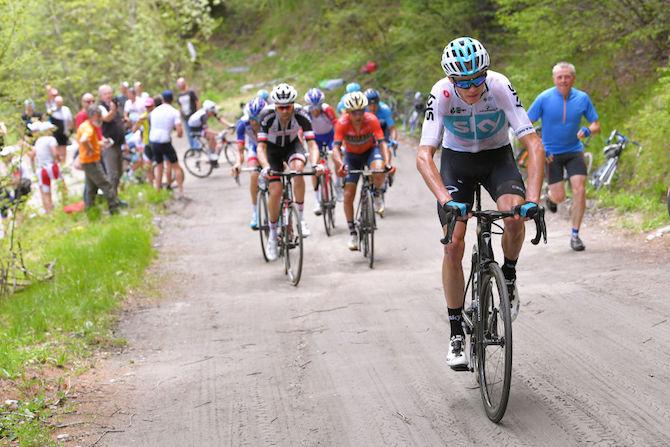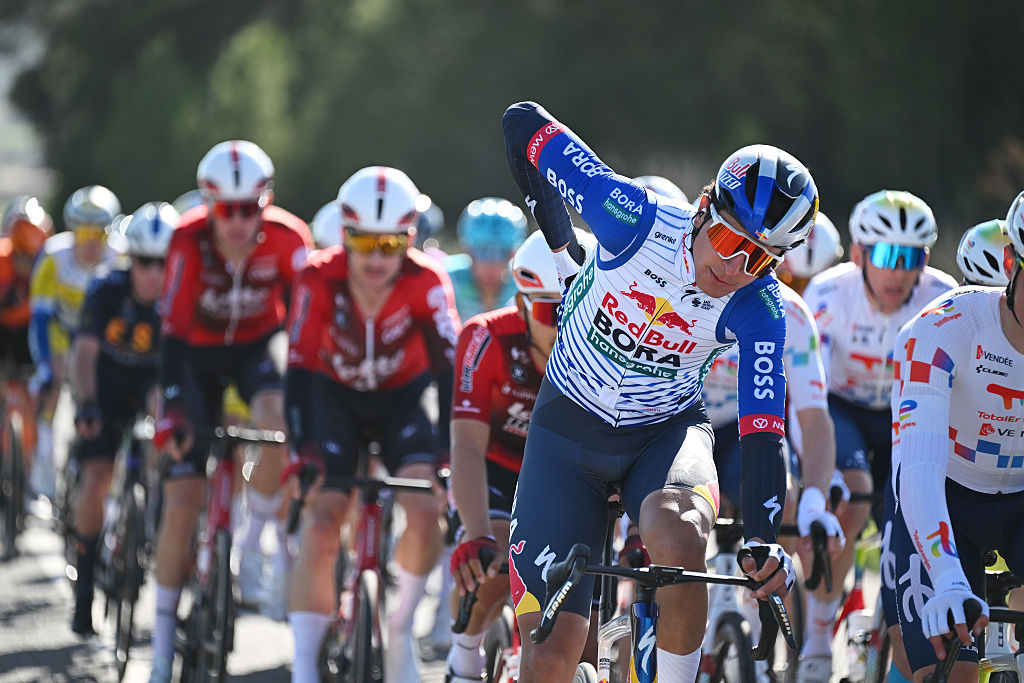Chris Froome ramps up Tour de France preparations after Giro d'Italia recovery
Coach Tim Kerrison says Froome is measurably stronger than ever
The latest race content, interviews, features, reviews and expert buying guides, direct to your inbox!
You are now subscribed
Your newsletter sign-up was successful
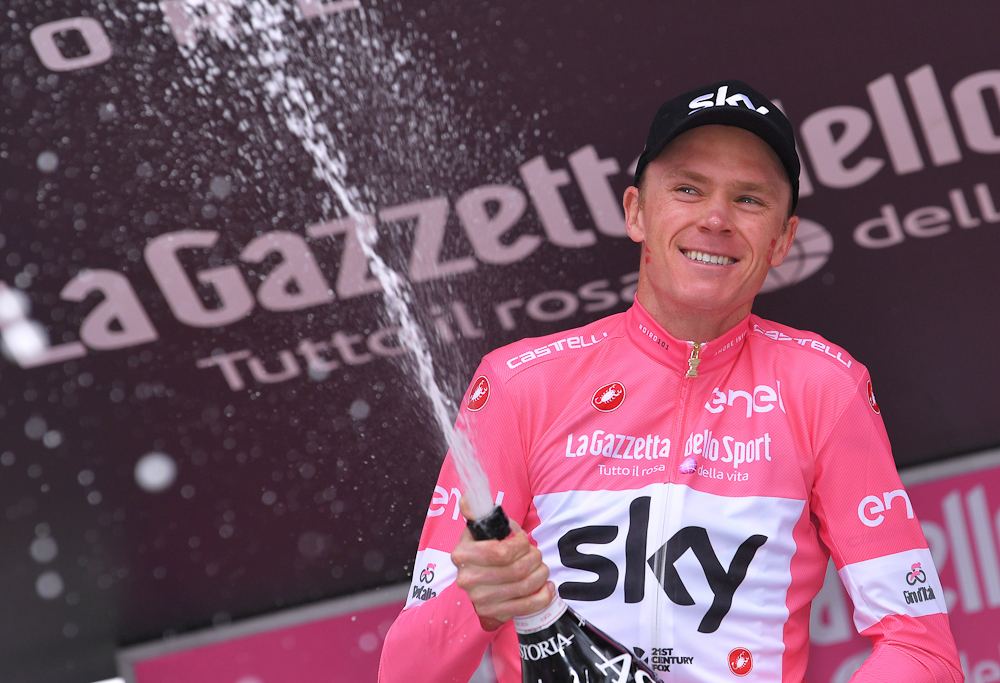
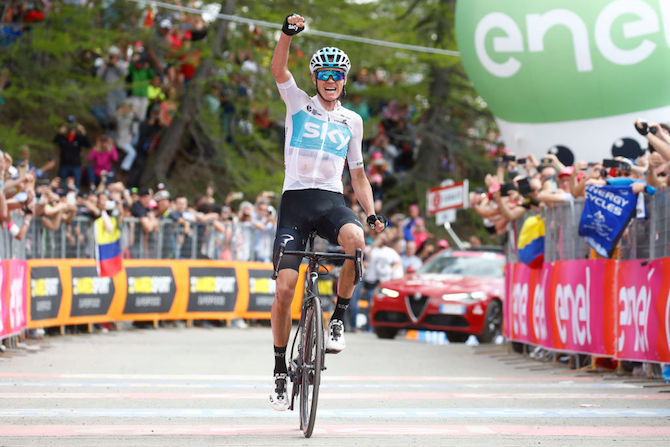
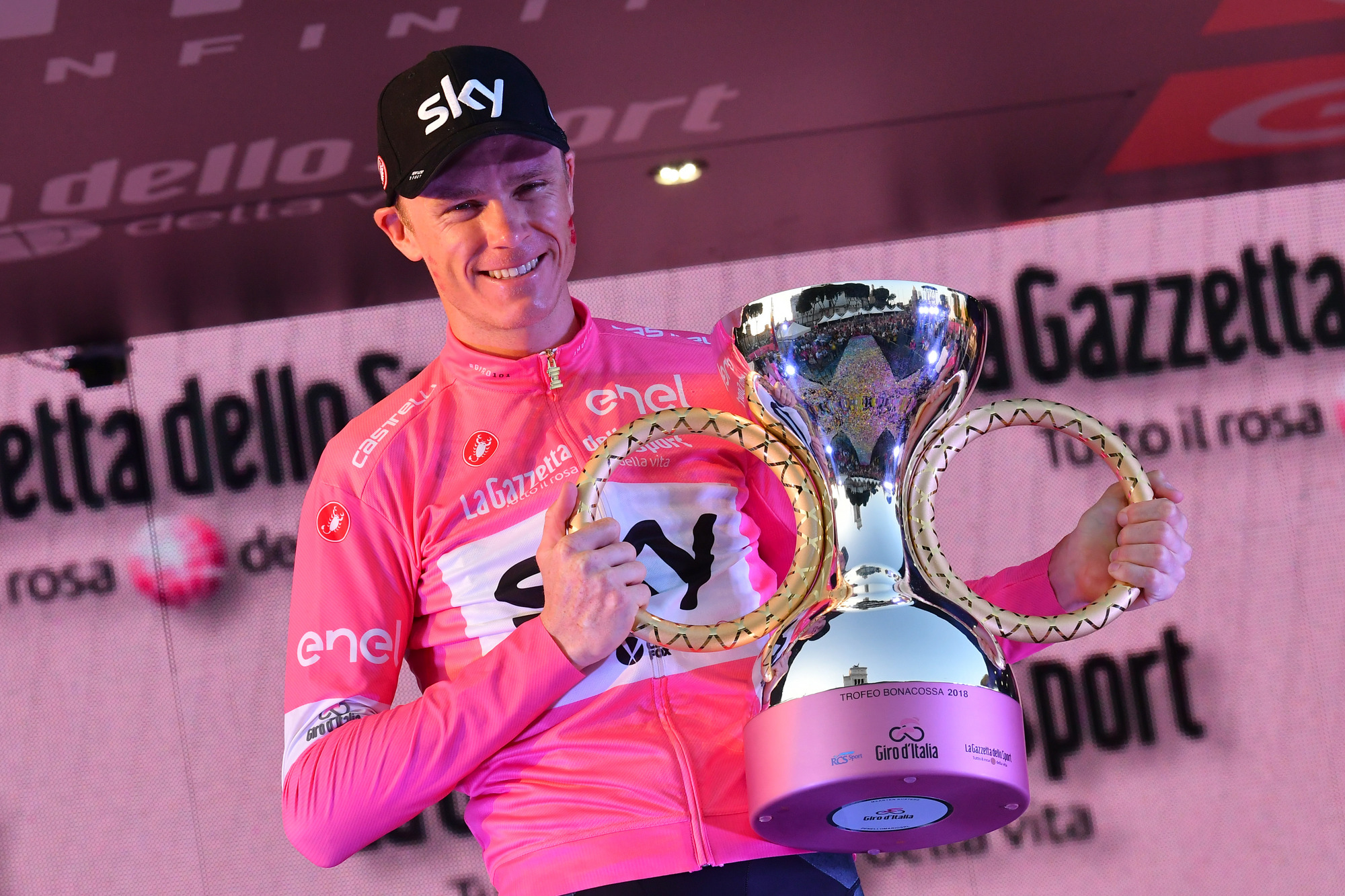

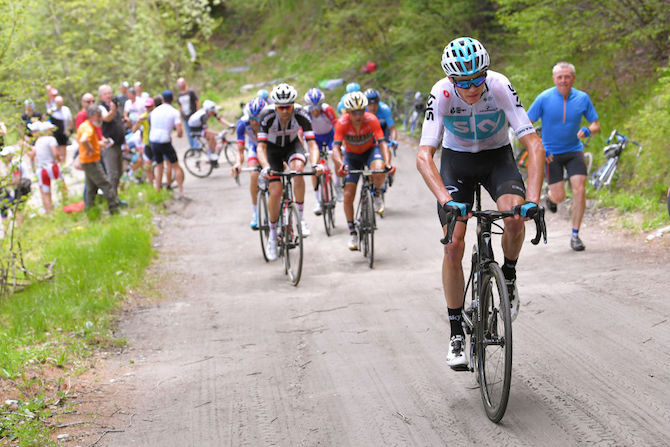
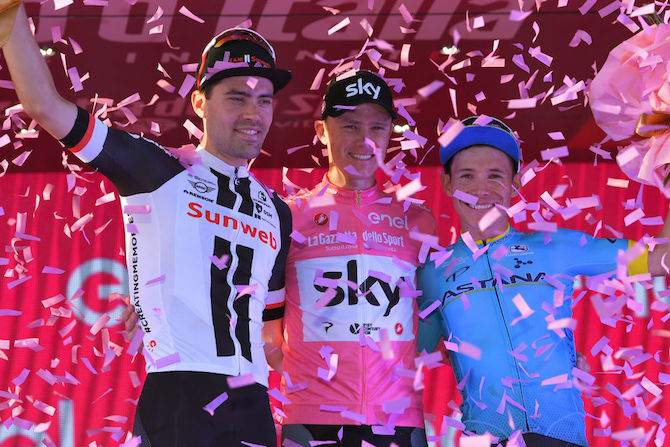
Chris Froome will ramp up his preparations for the Tour de France this weekend, travelling to France to recon some of the key stages in the Alps and Pyrenees and intensify his training after recovering from the exertions of the Giro d'Italia.
Chris Froome takes a provisional place in history with Giro d'Italia victory
Philippa York: Chris Froome and trying to understand the unbelievable
Hinault: Chris Froome should not have started the Giro, he should be suspended
Velon belatedly release Chris Froome's power numbers from Giro d'Italia attack
The Chris Froome debate and conclusions from the 2018 Giro d’Italia - Podcast
Rasmussen: Chris Froome's Giro d'Italia didn't raise a red flag
Lappartient says Chris Froome decision unlikely to come during Tour de France
Prudhomme demands answers on Chris Froome case before Tour de France
Froome, racing sub-judice pending a verdict in his salbutamol case, won the Giro d'Italia with a startling turnaround over the Colle delle Finestre on stage 19 and is bidding to become the first rider since Marco Pantani in 1998 to do the Giro-Tour double, a challenge that has stumped Nairo Quintana and Alberto Contador in recent years.
After Froome won the Tour de France and Vuelta a España last year, with four weeks between the two, he and Team Sky are convinced he can manage the tricky gap between Giro and Tour, which this year is six weeks long, up from five due to the football World Cup.
At the Critérium du Dauphiné, Team Sky coach Tim Kerrison explained to Cyclingnews exactly how they were approaching it.
"The general plan for those six weeks was a recovery phase, and that was always going to depend on how hard the Giro was and also on the emotional toll, which is different from race-to-race but always significant and can take as much time to adjust and recover from as the physical load," he said.
"So he's been back home with his family in Monaco. I don't think he touched his bike for the Monday or Tuesday after the race. He rode on Wednesday and did some media stuff on Thursday. That first week was an easy week."
Since last weekend, Froome has steadily increased his time on the bike, building the miles without training at any real intensity. That will change, however, when he travels to France this weekend.
The latest race content, interviews, features, reviews and expert buying guides, direct to your inbox!
"The next phase is a phase of recons. We'll be reconnoitring some of the Alps stages, then some of the Pyrenees stages and the time trial. So that will be recon plus there'll be a training load in there as well. We'll take that day-by-day according to what Chris is ready to do. Obviously, there's no problem riding his bike but in terms of intensity we'll gauge day-by-day what's needed," said Kerrison.
"The phase after that, which will be 10 days to two weeks, will just be a normal kind of pre-Grand Tour training block, with a little bit of an altitude top-up somewhere in there. Probably not on Mount Teide – there are other options nearer in Europe so we will probably stay local, possibly Isola. His usual approach to the Tour has been to race the Dauphiné then there are three or two-and-a-half weeks until he travels to the Tour, but we always do something after Dauphiné, a little training camp with a short altitude component to it."
Contador won the Giro d'Italia in 2015 and Quintana finished second last year, but both were some way short of their best when they arrived at the Tour de France. Team Sky, however, believe they can overturn the recent trends.
"Chris has experience backing up two Grand Tours, and with a lot less time than we've got for this one," said Kerrison. "This is a unique gap between two Grand Tours. We saw that as being an extra incentive or reason why. Six weeks is a long time to recover and get back to training and get some good training and recons done."
While the team claim Froome went into the Giro deliberately undercooked in a bid to gain form as the race went on, Kerrison suggested they won't be able to afford to hit the Tour in the same way, with a team time trial, cobbles, and punchy finishes making for a complicated first week before the mountains appear in the second half.
"We definitely need to arrive at the beginning of the Tour ready to race. The first nine days are going to be very interesting this year, with the TTT on stage 3, the cobbles on stage nine and a few other challenges like Mur de Bretagne. It's a very important first phase of the Tour.
"After the cobbled stage, there's the Alps and then the transition to the Pyrenees. We have short stages in the Alps and Pyrenees, then stage 20 is a time trial. The challenges of this Tour are spread through the three weeks, so we're going to have to be at a high level at the start and try to maintain that level."
An inconsistent Giro explained
Froome's performance at the Giro d'Italia has to go down as one of the most spectacular comebacks in Grand Tour history but, as a consequence of cycling's checkered past, many found the spectacle hard to believe.
Froome's exploits on stage 19 were extraordinary for any rider but even more so in the context of his Giro, where he seemed a shadow of his usual self for much of the race. He crashed ahead of the opening time trial and lost time at various points in the first week. There was a sudden change of fortune as he won on Monte Zoncolan on stage 14 but he immediately shipped more than a minute the following day. It is safe to say that few were expecting what happened on stage 19.
"I think what we saw in the Giro was that his performance wasn't as consistent as it normally is," Kerrison told Cyclingnews.
"We saw his time trial was very good – not far off his best – and the Zoncolan a few days before was more or less comparable with his best ever climbing performances. But there was definitely an element of less consistency than we've seen in the past. But there were also signs that he was physically capable of performing at his best."
As he and Dave Brailsford expounded in a recent BBC article, Kerrison talked of the Finestre stage as a perfect storm of meticulous planning on the one hand and, on the other, complete coincidence.
In 2017 they had been out to recon the Finestre between the Dauphiné and the Tour, a revelation that has seen the social media debate ignite once again with accusations that Sky somehow got hold of the Giro route before it was unveiled in November.
"We basically reconned the whole stage, except the final climb to the Jafferaru. We didn't know it was in the race, we didn't know he was going to do the race, we just, we were there, we had a spare training day and thought that's a pretty iconic climb," said Kerrison.
"Whenever we do training camps, part of the reason of doing a camp in the Alps is to get to know the Alps because one day they will race over those climbs. It was really coincidental and fortunate that within 12 months he was not only racing on Finestre and the descent but also the drag up to Sestrière and the descent down. It was one of the most important stages in his career."
Measurably stronger
In a comment piece for Cyclingnews, Philippa York captured the scepticism surrounding Froome and argued that "despite what anyone says, you don't ride yourself into form in a brutal three-week race". Kerrison, however, maintained that's what happened.
"I think it was pretty clear he wasn't at peak form at the beginning of the Giro. Given the reduced amount of time to achieve his big form coming into the Giro, he wasn't at top top form in the Giro, but coming into a Grand Tour, it's always a balance between being in your best form and being fresh, and something we've become more conscious of over the years is that you've got to be ready for that first week of racing, but you've got to be fresh enough that you can as much as possibly maintain – or even build – your condition through the race. If you think of form as being a balance between condition and fatigue, obviously at the end of a Grand Tour there's a lot of fatigue, but if you still have your condition, and manage the fatigue, then you've got a chance of maintaining good form at the race."
In terms of Froome's form, taken in the arc of his career as a whole, it's interesting that Kerrison describes the Zoncolan victory as 'more or less comparable with his best ever climbing performances'. Froome himself said in November that his climbing numbers were better than ever. Yet, before the Giro at least, it seemed his powers had waned.
Gone were the devastating attacks on the Tour's summit finishes – notably Ax 3 Domaines and Mont Ventoux in 2013 and La Pierre-Saint-Martin in 2015 – and in its place a more conservative approach in which he made gains in the time trials and actually only lost ground uphill. On top of that, his wins outside the Grand Tours have dried up in the past year or so.
"Part of that is the opposition is getting stronger – there's no doubt about that. Chris is having to continue to get stronger. Measurably he is stronger than he was when perhaps it appeared he was more dominant," said Kerrison.
"Partly it's the way races are raced, if you think about some of the big stages of the Tour last year, for example, the Telegraphe-Galibier stage, because Contador took it on so early, it mean the whole race – a bit like the Finestre stage – was a big four-hour effort instead of a more controlled race to the final climb, where the final climb is the most explosive effort.
"He – and the rest of the field – continues to get stronger year-by-year."
Cyclingnews Films' second production CRESCENDO is available to buy or rent on Vimeo.
CRESCENDO from Cyclingnews Films on Vimeo.

Patrick is an NCTJ-accredited journalist with a bachelor’s degree in modern languages (French and Spanish) and a decade’s experience in digital sports media, largely within the world of cycling. He re-joined Cyclingnews as Deputy Editor in February 2026, having previously spent eight years on staff between 2015 and 2023. In between, he was Deputy Editor at GCN and spent 18 months working across the sports portfolio at Future before returning to the cycling press pack. Patrick works across Cyclingnews’ wide-ranging output, assisting the Editor in global content strategy, with a particular focus on shaping CN's news operation.
